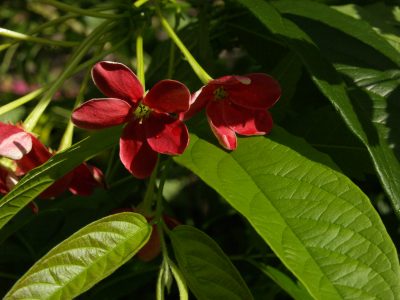How should I mulch when light rain doesn’t make it down to the plant roots?
Thanks to Pete Vera for this great question! He writes: “I’ve always heard that mulch helps keep moisture in the ground. But, after a 1/2″ rainfall event last year, I was shocked to see that the mulch also prevented the rainfall from penetrating the ground. The soil was absolutely dry after 1/2″ of rain. What should I do this year?”
Well, Pete, your observation is correct. Because of the extremely hot, dry weather last year, organic mulch got, and stayed, really dry, creating a sort of crust on top of the soil. So when it rained, the mulch soaked up some of the water, but since it was so dry, much of the water may have run off to surrounding areas because it couldn’t soak in fast enough.
The mulch was still doing its job though: protecting the soil from the elements and insulating it to keep it cooler, and keep moisture from evaporating so quickly.
So, back to your question of what to do: you should still use mulch, only instead of using the standard recommendation of two to three inches, maybe cut back to only one, so the rain-blocking crust doesn’t get so thick. During extremely hot, dry times, the lack of moisture also keeps the mulch from breaking down at the soil surface and becoming soil-building organic matter for the future.
In my garden, I usually just add a one-inch layer of new mulch to the top of last year’s. But this year, I went ahead and removed most of the old mulch and put it in my compost pile before I added new mulch. Last year’s dry, crusty mulch would eventually break down, with enough moisture, but you don’t want to make the layer even thicker by just adding mulch on top.
Another helpful thing to do this year would be to add drip irrigation or soaker hoses to your beds under the mulch, if possible. Adding moisture underneath the mulch will ensure that your plants get water directly where they need it.
And if you don’t have a compost pile for your old mulch, put it out in paper bags by the curb with your other yard waste, so that the city can turn it into compost.

 Robin Howard Moore
Robin Howard Moore Emerald Garden’s Summer Plant List
Emerald Garden’s Summer Plant List Daphne Richards
Daphne Richards
 Trisha Shirey
Trisha Shirey